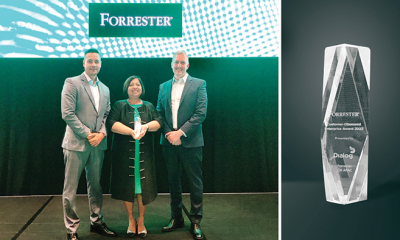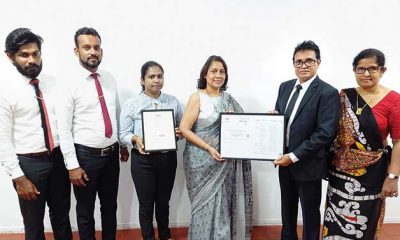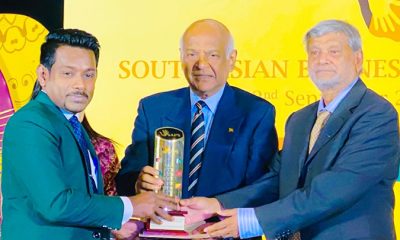News
Baurs laboratory services pioneers with ISO accreditation awarded for organic fertilizers
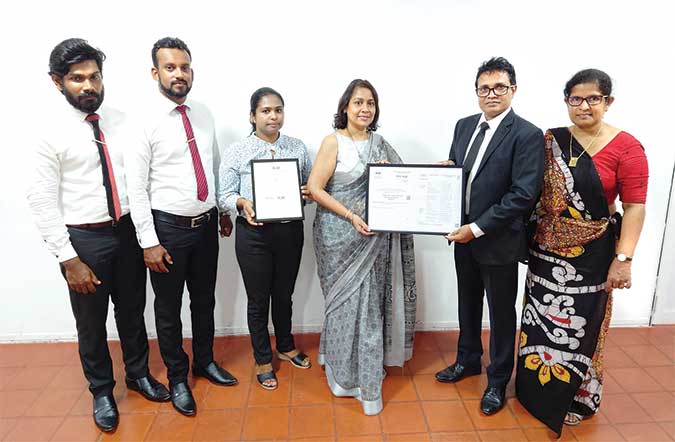
The laboratory services of A. Baur & Co. (Pvt) Ltd, also known as Baurs, a leading diversified conglomerate with values deeply rooted in its Swiss traditions and a pioneer in the agriculture sector of Sri Lanka known for its various industry-first initiatives and a track-record for continuous innovation, was recently awarded the international standard accreditation for organic fertilizers.
As the industry pioneers, Baurs stepped up to obtain this most sought-after accreditation, ISO/IEC 17025 in organic fertilizer testing in the country and having successfully completed all requirements and adherence to the standards including its management system, technical competency, and the validity of laboratory testing processes, it was awarded during early last Month.
This marks a significant milestone in the company’s journey in setting itself as a center of excellence for the sustainable development of the Sri Lankan agriculture sector, actively engaging with numerous stakeholders in the industry. This will help Baurs further enable in promoting sustainable farming practices, improving crop yields and growth, ensuring healthy food for the community, and reducing environmental risks to both the farmers and the wider community.
Baurs has been on the forefront of the transition, pursuing various knowledge-sharing initiatives with globally renowned experts in the field of organic agriculture and actively engaging with various stakeholders in Sri Lanka, with the aim of sharing both sound scientific and technical expertise and insights.
The accreditation also sets the stage for many others to follow suit, setting the benchmark for quality testing standards for organic fertilizers. Being an accredited laboratory, with ISO-17025-2017 being the globally recognized standard for testing and calibration laboratories, assures that organic fertilizer tests are conducted accurately, reliably, and with the highest level of precision, with results consistent with national and international standards acceptable to customers and regulators.
Baurs laboratory was firstly accredited for inorganic fertilizers in 2015, and since then have evolved and transformed to one of the most pioneering and modern laboratory services in the in the fertilizer industry covering a range of fertilizer test methods that are complying with some of the latest ISO standard versions. Since 1997, the laboratory continues to strictly adhere with SLS, ISO standards.
News
PUCSL and Treasury under IMF spotlight as CEB seeks 11.5% power tariff hike
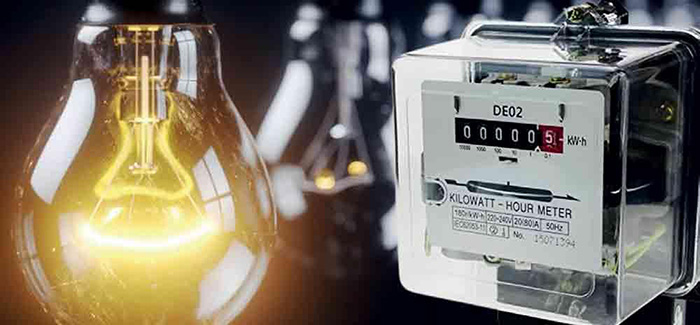
The Public Utilities Commission of Sri Lanka (PUCSL) and the Treasury are facing heightened scrutiny as the Ceylon Electricity Board (CEB) presses for an 11.5 percent electricity tariff increase, a move closely tied to IMF-driven state-owned enterprise (SOE) reforms aimed at curbing losses and easing fiscal pressure on the State.
The proposed hike comes as the Treasury intensifies efforts to reduce the budgetary burden of loss-making SOEs under Sri Lanka’s IMF programme, which places strong emphasis on cost-reflective pricing, improved governance and the elimination of quasi-fiscal deficits.
Power sector sources said the PUCSL has completed its technical evaluation of the CEB proposal and is expected to announce its determination shortly.
The decision is being closely watched not only as a test of regulatory independence, but also as an indicator of how Treasury-backed fiscal discipline is being enforced through independent regulators.Under the IMF agreement, Sri Lanka has committed to restructuring key SOEs, such as, the CEB to prevent recurring losses from spilling over into public finances.
Treasury officials have repeatedly warned that continued operational losses at the utility could ultimately require state intervention, undermining fiscal consolidation targets agreed with the IMF.
The CEB has justified the proposed 11.5 percent hike by citing high generation costs, foreign currency loan repayments and accumulated legacy losses, arguing that further tariff adjustments are necessary to stabilise finances and avoid a return to Treasury support.
However, critics argue that IMF-aligned reforms should not translate into routine tariff hikes without meaningful improvements in efficiency, cost controls and governance within the utility.
Trade unions and consumer groups have urged the PUCSL to resist pressure from both the CEB and fiscal authorities to simply pass costs on to consumers.
They also note that improved hydropower availability should reduce dependence on expensive thermal generation, easing cost pressures and giving the regulator room to moderate any tariff increase.
Energy analysts say the PUCSL’s ruling will reflect how effectively the Treasury’s fiscal objectives are being balanced against the regulator’s statutory duty to protect consumers, warning that over-reliance on tariff increases could erode public support for IMF-backed reforms.
Business chambers have cautioned that another electricity price hike could weaken industrial competitiveness and slow economic recovery, particularly in export-oriented and energy-intensive sectors already grappling with elevated costs.
Electricity tariffs remain one of the most politically sensitive aspects of IMF-linked restructuring, with previous hikes triggering widespread public discontent and raising concerns over social impact.
The PUCSL is expected to outline the basis of its decision, including whether the proposed 11.5 percent increase will be approved in full, scaled down, or restructured through slab-based mechanisms to cushion low-income households.
An energy expert stressed that Sri Lanka navigates IMF-mandated fiscal and SOE reforms, the forthcoming ruling is widely seen as a defining moment—testing not only the independence of the regulator, but also the Treasury’s ability to pursue reform without deepening the burden on consumers.
By Ifham Nizam ✍️
News
Bellana says Rs 900 mn fraud at NHSL cannot be suppressed by moving CID against him

Massive waste, corruption, irregularities and mismanagement at laboratories of the country’s premier hospital, revealed by the National Audit Office (NAO), couldn’t be suppressed by sacking or accusing him of issuing death threats to Health Secretary Dr. Anil Jasinghe, recently sacked Director of the National Hospital of Sri Lanka (NHSL) Dr. Rukshan Bellana told The Island.
Dr. Bellana said so responding to Dr. Jasinghe’s request for police protection claiming that he (Bellana) was directly responsible for threatening him.
The NPP government owed an explanation without further delay as the queries raised by NAO pertained to Rs 900 mn fraud/loss caused as a result of procurement of chemical reagents for the 2022 to 2024 period remained unanswered, Dr. Bellana said, pointing out that NAO raised the issue in June last year.
Having accused all other political parties of corruption at all levels, the NPP couldn’t under any circumstances remain mum on NAO’s audit query, DR. Bellana said, claiming that he heard of attempts by certain interested parties to settle the matter outside legal procedures.
The former GMOA official said that the NPP’s reputation was at stake. Perhaps President Anura Kumara Dissanayake should look into this matter and ensure proper investigation. Dr. Bellana alleged that those who had been implicated in the NAO inquiry were making an attempt to depict procurement of shelf time expired chemical reagents as a minor matter.
By Shamindra Ferdinando ✍️
News
First harvest of rice offered to Dalada Maligawa

Continuing a centuries-old tradition, dating back to the era of ancient kings, the annual ‘Aluth Sahal Mangalya’—the offering of alms prepared from the maiden harvest of rice—was ceremonially observed at the Sri Dalada Maligawa on Duruthu Full Moon Poya Day, 03rd January.
The religious observances were conducted with the participation of Ven. Thibbatuwawe Sri Medhankara Thera, a member of the Thevava (officiating clergy) of the Sacred Tooth Relic, and Diyawadana Nilame Pradeep Nilanga Dela.
In keeping with long-established customs, paddy harvested from lands belonging to the Sri Dalada Maligawa was brought from the Atuwa (granary) in Pallekele. The newly harvested rice was subsequently prepared and offered as Buddha Pooja to the Sacred Tooth Relic.
Text and Pic by SK Samarnayake ✍️
-

 News2 days ago
News2 days agoHealth Minister sends letter of demand for one billion rupees in damages
-

 News5 days ago
News5 days agoLeading the Nation’s Connectivity Recovery Amid Unprecedented Challenges
-

 Features6 days ago
Features6 days agoIt’s all over for Maxi Rozairo
-

 Opinion4 days ago
Opinion4 days agoRemembering Douglas Devananda on New Year’s Day 2026
-

 News6 days ago
News6 days agoDr. Bellana: “I was removed as NHSL Deputy Director for exposing Rs. 900 mn fraud”
-

 News5 days ago
News5 days agoDons on warpath over alleged undue interference in university governance
-

 Features6 days ago
Features6 days agoRebuilding Sri Lanka Through Inclusive Governance
-

 Business5 days ago
Business5 days agoSri Lanka Tourism surpasses historic milestone with record tourist arrivals in 2025


